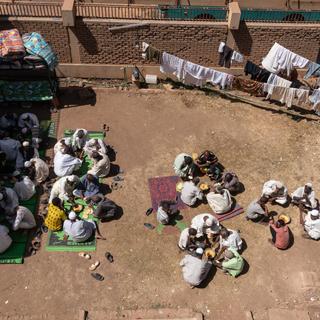


War in Sudan: The ordeal of those besieged on Tuti Island
Feature'In Sudan, a total war' (2/8). Tuti Island was a garden island in the heart of Khartoum until the civil war broke out in April 2023. Connected to the capital by a bridge over the Nile, this once-popular spot for family outings has become a hellish place.
Located at the confluence of the White and Blue Niles, Tuti Island had once been a quiet little paradise at the heart of a noisy megalopolis. Right in the center of Khartoum, locals would come to stroll around this green heath, which takes the shape of a crescent moon, barely totaling 8 square kilometers, surrounded by water. Along the railings of the lone bridge linking Tuti to the mainland, young couples would discreetly hold hands, being immortalized by amateur photographers against the setting sun.

Lined with fields full of broad beans, arugula and vegetables, the island was once known as the garden of Sudan's capital. When the sun beat down too hard, farmers would doze there, in the shade of palm trees. When it waned, fishermen would cast their nets along its muddy banks. On its eastern flank, an immense beach of fine sand, deposited there by the river, was once the meeting place for families who would come here for lunch, sitting with their feet in the water on multicolored plastic chairs. The gurgling of hookahs and the regular sounds of the motor pumps that irrigated the crops formed the soundtrack of a peaceful way of life.
Then, the war broke out. Since April 15, 2023, caught up in the fighting between the Sudanese Armed Forces (SAF) led by General Abdel Fattah al-Burhan and the Rapid Support Forces (RSF), a militia organization led by General Mohammed Hamdan Dagalo, known by his nickname "Hemedti," the island – once nicknamed "The Hyacinth of the Nile" – has become a pastoral killing field. For 18 months, the island's inhabitants endured occupation by the paramilitaries, who committed countless abuses in this enclave, which they converted into an open-air prison.
In October, following the regular army's counter-offensive in downtown Khartoum, Tuti was completely emptied. Within weeks, the island's 30,000 inhabitants, who had fallen hostage to the war, had fled. With the exception of around 50 of them, a few shepherds and a handful of elderly people, there is not a soul left to be found there.
In the city of Omdurman, on the west bank of the Nile, more than 400 survivors from Tuti have found refuge in the Al-Manial boarding school, crammed into dormitories that, before the war, had housed female university students. In the courtyard, suitcases full of clothes lay piled up. Inside the brick building, the men were housed on the first floor, the elderly women on the second floor, and the children and their mothers on the top floor. All of them slept on scrap metal bunk beds.
You have 74.74% of this article left to read. The rest is for subscribers only.
